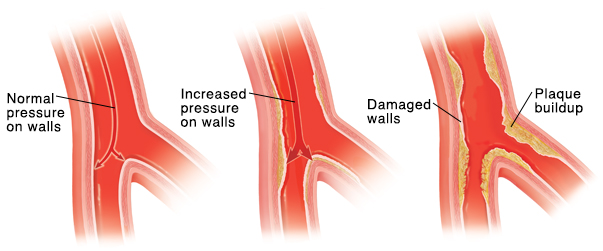High Blood Pressure
Understanding High Blood Pressure
High blood pressure or hypertension is known as a silent killer. This is because it's a serious health problem, but often doesn’t cause symptoms. Many people don’t know they have it until it leads to other health problems.
Normal blood pressure is less than 120/80 mmHg. If you’re above this level for several readings over time, you’ll be diagnosed with high blood pressure. Healthy changes can help you lower your blood pressure. But once you’re diagnosed, you'll need to manage it for the rest of your life.
What is blood pressure?
Your heart pumps blood into the blood vessels that carry it through your body. With each heartbeat the heart pushes blood through blood vessels called arteries. Blood pressure is a measure of how hard the blood pushes against the walls of the arteries as it flows.
How high blood pressure harms your health
In a healthy artery, the blood moves smoothly and puts normal pressure on its walls.

High blood pressure means the blood is pushing too hard against artery walls. This damages the walls. The walls form scar tissue as they heal. But the scar tissue makes the arteries stiff and weak. A fatty substance called plaque sticks to the scar tissue. This makes arteries narrower and harder.
High blood pressure:
- Causes your heart to work harder to get blood around your body
- Raises your risk for heart attack, heart failure, and stroke
- Can lead to kidney disease and blindness
Check blood pressure
It's important to know your blood pressure numbers. A blood pressure reading is given as 2 numbers, such as 120/70. The top number is the pressure of blood against the artery walls during a heartbeat. That's calledsystolic. The bottom number is the pressure of blood against artery walls between heartbeats. That's called diastolic.
Blood pressure may be:
-
Normal: systolic lower than 120 and diastolic lower than 80
-
Elevated: Systolic of 120-129 and diastolic less than 80
-
High, Stage 1: Systolic of 130-139 or diastolic of 80-89
-
High, Stage 2: Systolic of 140 or higher or diastolic of 90 and higher
For most people with high blood pressure, keeping readings under 130/80 mmHg may help prevent health problems. Talk with your healthcare provider. Find out what your blood pressure goals should be. Tell them what concerns you have about your readings.
Control high blood pressure
If your blood pressure is high, work with your healthcare provider to lower it. Lifestyle changes and possibly medicines may help.
Below are changes you can make to help lower your blood pressure:
-
Choose heart-healthy foods. Ask your provider about the Dietary Approaches to Stop Hypertension (DASH) eating plan. DASH limits sodium (salt). It includes a lot of fruits and vegetables, low-fat or nonfat dairy foods, whole grains, and other foods high in fiber and low in fat. This plan also includes more dietary potassium. This can help lower blood pressure.
-
Cut sodium. Eating less sodium reduces fluid retention. This is when your body holds on to too much water. Having too much salt increases blood volume and blood pressure. The American Heart Association says the ideal limit is no more than 1,500 mg of sodium a day, especially if you have high blood pressure. But because people in the U.S. eat so much salt, they say cutting back to even 2,300 mg a day can help. Having only 1,000 mg of sodium a day can help your blood pressure and heart.
-
Stay at a healthy weight. Being overweight makes you more likely to have high blood pressure. Losing excess weight helps lower blood pressure.
-
Exercise regularly. Daily exercise helps your heart and blood vessels work better and stay healthier. It can help lower your blood pressure.
-
Don't smoke. Smoking raises blood pressure. And it damages blood vessels.
-
Limit alcohol. Drinking too much alcohol can raise blood pressure. Men should have no more than 2 drinks a day. Women should have no more than 1 a day. A drink is equal to 1 beer, a small glass of wine, or a shot of liquor.
-
Control stress. Stress makes your heart work harder and beat faster. Managing stress in a healthy way helps you control your blood pressure.
Facts about high blood pressure
-
High blood pressure is often a lifelong problem. But it can be controlled with lifestyle changes and medicine.
-
Blood pressure medicines need to be taken every day. Stopping suddenly may cause a dangerous increase in pressure.
-
Medicine is only one part of controlling high blood pressure. You also need to manage your weight, get regular exercise, and change your eating habits.
-
Hypertension isn't the same as stress. Stress may be a factor in high blood pressure, but it’s only one factor.
-
Feeling OK doesn't mean your blood pressure is under control. And feeling bad doesn’t mean it’s out of control. The only way to know for sure is to check your pressure regularly.
Controlling High Blood Pressure
Controlling High Blood Pressure
High blood pressure (hypertension) is often called the silent killer. This is because many people who have it, don’t know it. It can be very dangerous. High blood pressure can raise your risk of heart attack, stroke, heart disease, and heart failure. Controlling your blood pressure can lower your risk of these problems. It's important to check your blood pressure regularly. It can save your life.
Blood pressure measurements are given as 2 numbers. Systolic blood pressure is the upper number. This is the pressure when the heart contracts. Diastolic blood pressure is the lower number. This is the pressure when the heart relaxes between beats.
Blood pressure is grouped like this:
-
Normal blood pressure. This is systolic of less than 120 and diastolic of less than 80
-
Elevated blood pressure. This is systolic of 120 to 129 and diastolic less than 80.
-
Stage 1 high blood pressure. This is systolic of 130 to 139 or diastolic between 80 to 89.
-
Stage 2 high blood pressure. This is systolic of 140 or higher or diastolic of 90 or higher.
A heart-healthy lifestyle can help you control your blood pressure without medicines. Below are some things you can do to have a heart-healthy lifestyle.

Eat heart-healthy foods
-
Choose low-salt, low-fat foods. Limit your sodium to 2,300 mg per day or the amount advised by your healthcare provider.
-
Limit canned, dried, cured, packaged, and fast foods. These can contain a lot of salt.
-
Eat 8 to 10 servings of fruits and vegetables every day.
-
Choose lean meats, fish, or chicken.
-
Eat whole-grain pasta, brown rice, and beans.
-
Eat 2 to 3 servings of low-fat or fat-free dairy products.
-
Ask your healthcare provider about the DASH eating plan. This plan helps reduce blood pressure.
-
When you go to a restaurant, ask that your meal be made with no added salt.
Stay at a healthy weight
-
Ask your healthcare provider how many calories to eat a day. Then stick to that number.
-
Ask your provider what weight range is healthiest for you. If you are overweight, a weight loss of only 3% to 5% of your body weight can help lower blood pressure. A good weight loss goal is to lose 10% of your body weight in a year.
-
Limit snacks and sweets.
-
Get regular exercise.
Get more active
-
Find activities you enjoy. They can be done alone or with friends or family. Try bicycling, dancing, walking, or jogging.
-
Park farther away from building entrances to walk more.
-
Use stairs instead of the elevator.
-
When you can, walk or bike instead of driving.
-
Rake leaves, garden, or do household repairs.
-
Be active at a moderate to vigorous level of physical activity for at least 30 minutes a day for at least 5 days a week.
Manage stress
-
Make time to relax and enjoy life. Find time to laugh.
-
Talk about your concerns with your loved ones and your healthcare provider.
-
Visit with family and friends, and keep up with hobbies.
Stay away from or limit alcohol and quit smoking
-
Men should have no more than 2 drinks per day.
-
Women should have no more than 1 drink per day.
-
If you smoke, make a plan to stop. Talk with your healthcare provider for help. Smoking greatly raises your risk for heart disease and stroke. Ask your provider about stop-smoking programs and other support.
Get enough good quality sleep
-
Most adults need about 7 to 9 hours of sleep a day
-
Have a regular sleep schedule. Go to sleep and wake up at the same time every day.
Blood pressure medicines
If your lifestyle changes aren’t enough, your healthcare provider may prescribe high blood pressure medicine. Take all medicines as prescribed. If you have any questions about your medicines, ask your provider before stopping or changing them.
How daily issues affect your health
Many things in your daily life impact your health. This can include transportation, money problems, housing, access to food, and child care. If you can’t get to medical appointments, you may not receive the care you need. When money is tight, it may be difficult to pay for medicines. And living far from a grocery store can make it hard to buy healthy food.
If you have concerns in any of these or other areas, talk with your healthcare team. They may know of local resources to assist you. Or they may have a staff person who can help.
Advanced Care
If your blood pressure is not well-controlled with medications and lifestyle changes, contact Saint Luke’s Cardiovascular Consultants. Our team offers renal denervation, a novel treatment to help patients with resistant hypertension.